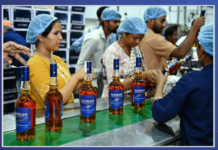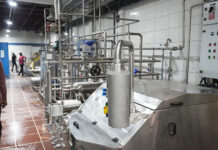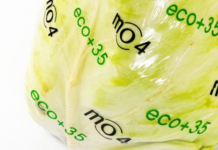
In 2017, the Sidel Aseptic Combi Predis blow fill seal filler was validated by the American Food and Drug Administration (FDA) for low acid products sold in the US – an industry first. With more than 180 references at major beverage and dairy companies since the launch of this solution in early 2000, the repeated orders recorded by this technology underline its success.
According to Sidel, since the first FDA approval, many beverage and dairy players, located in the US, Asia, and South America, have trusted the company’s dry preform decontamination technology to develop their business in the US. This customer success reflects the global achievements collected by Predis technology since its launch — it has decontaminated more than 60 billion bottles while saving over 10 billion liters of water and 60,000 tons of PET, Sidel said.
The Aseptic Combi Predis differs from former aseptic bottling technologies because the PET package sterilization already occurs at the preform stage rather than during the bottling phase. The solution marks an essential step towards sustainable production because it does not require any water and uses only a minimal amount of chemicals. Its blower oven activates the sterilizing effect of the hydrogen peroxide (H2O2) vapor, thus eliminating the need for additional heating of the preforms, saving further on resources.
Designed to offer maximum safety and simplicity

The Sidel Aseptic Combi Predis contributes to production simplicity and reliability because a line with a small sterile zone and minimum critical factors is managed and maintained more safely, easily, and effectively, says Sidel. The dry preform sterilization before the oven prevents re-contamination and avoids the need for blow molder sterilization. It also claims to eliminate constraints related to the bottle shape’s complexity. Therefore, the solution can handle bottle formats from 200 ml to 3 liters with any shape. For better flexibility, format changeovers are easy and fast, taking only one minute per mold. In its latest generation – the Versatile Aseptic Combi Predis – the solution claims to manage still beverages and carbonated soft drinks in PET on one piece of equipment.
Role in sensitive beverages and liquid dairy production
Sidel says, players across the globe have taken up the opportunity to acquire the Sidel aseptic blow fill seal system to manufacture and distribute shelf-stable low acid products in PET bottles. These include milk and liquid dairy products, dairy alternatives, and plant-based beverages like soy milk and coconut drinks. On top of being compliant with the FDA’s current Good Manufacturing Practice (cGMP) requirements and bearing the 3-A certification for its sanitary design since 2017, the solution has also been approved by the Canadian Food Inspection Agency (CFIA), a must-have for selling sensitive products in the Canadian market.

“With the world’s first FDA-approved aseptic solution with dry preform sterilization on the market three years ago, Sidel has been enjoying a continuously growing global leadership role in sensitive beverages and liquid dairy production technology. The high level of customer acceptance and the many repeat orders are due to the fact that our patented system is 100% safe and simple for the packaging of low acid sensitive products in PET bottles, sold through ambient chain. We are very proud of this big success,” says Guillaume Rolland, vice president Sensitive Products at Sidel.
“Also, thanks to the great ease of operations offered by the solution, the FDA validation can be applied to upgrade the Aseptic Combi Predis already installed and running in customer plants. This opens the doors to new business opportunities for customers willing to start selling low acid products to the US,” concludes Rolland.
IndiFoodBev — authentic, impactful and influential
An English-language food and beverage processing and packaging industry B2B platform in print and web, IndiFoodBev is in its third year of publication. It is said that the Indian food and beverage industries represent approximately US$ 900 billion in revenues which implies more than 20% of the country’s GDP. Eliminating the wastage on the farmside can help to deliver more protein to a higher number of the population apart from generating sizable exports. The savings in soil, seeds, water, fertilizer, energy and ultimately food and nutrition could be the most immense contribution that country is poised to make to the moderation of climate change.
To improve your marketing and grow sales to the food and beverage processing and packaging industry, talk to us. Our research and consulting company IppStar [www.ippstar.org] can assess your potential and addressable markets in light of the competition. We can discuss marketing, communication, and sales strategies for market entry and growth.
Suppliers and service providers with a strategy and budget for targeted marketing can discuss using our hybrid print, web, video, and social media channels to create brand recognition linked to market relevance. Our technical writers are ready to meet you and your customers for content.
The second largest producer of fruit and vegetables in the world is continuously expanding processing capacities and delivery systems with appropriate innovative technologies. We cover product and consumer trends, nutrition, processing, research, equipment and packaging from farm to thali. Get our 2025 media kit and recalibrate your role in this dynamic market. Enhance your visibility and relevance to existing markets and turn potential customers into conversations. Ask for a sample copy of our bi-monthly in print or our weekly IndiFoodBev eZine each Wednesday.
For editorial info@ippgroup.in — for advertisement ads1@ippgroup.in and for subscriptions subscription@ippgroup.in
Naresh Khanna – 10 February 2025
Subscribe Now










